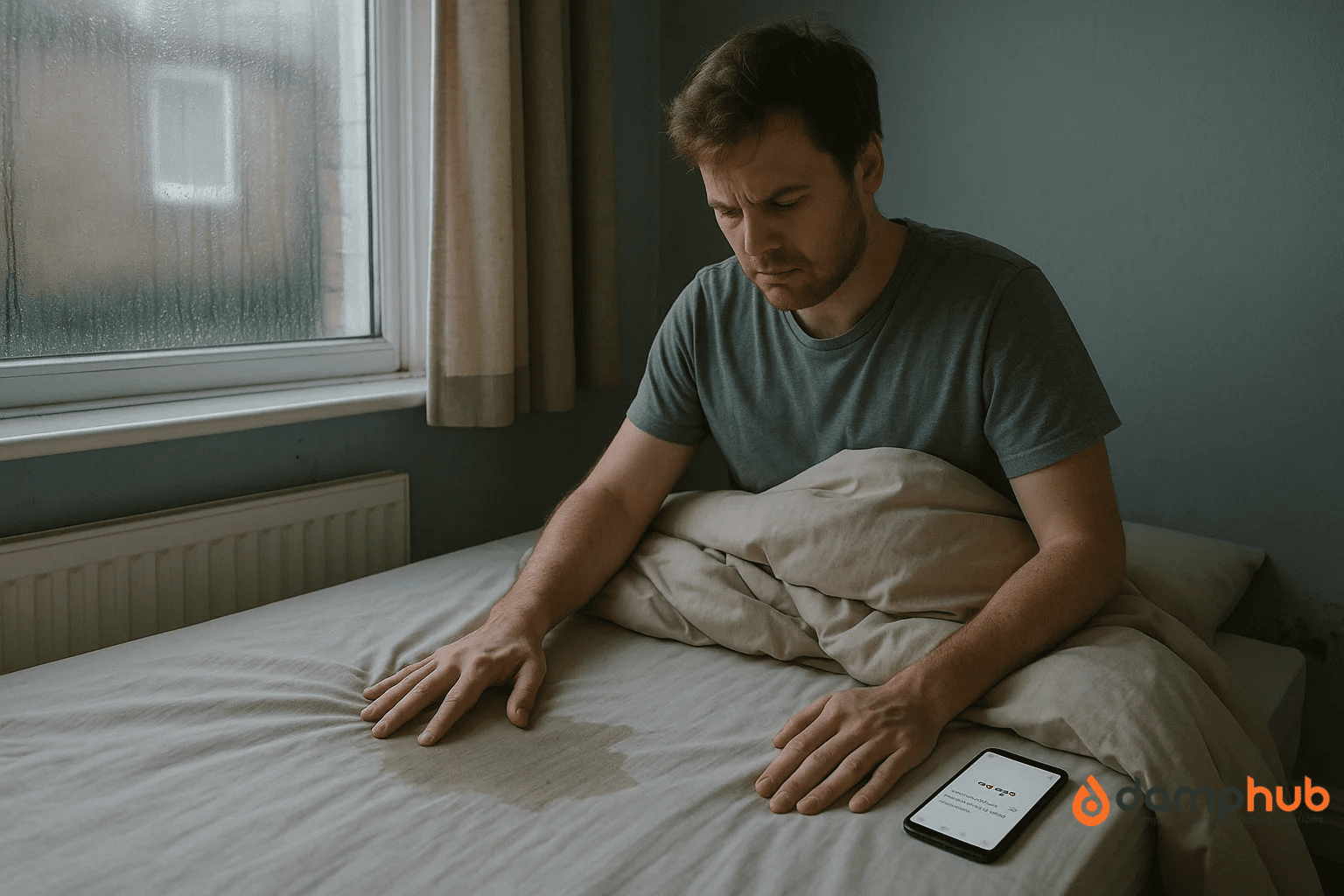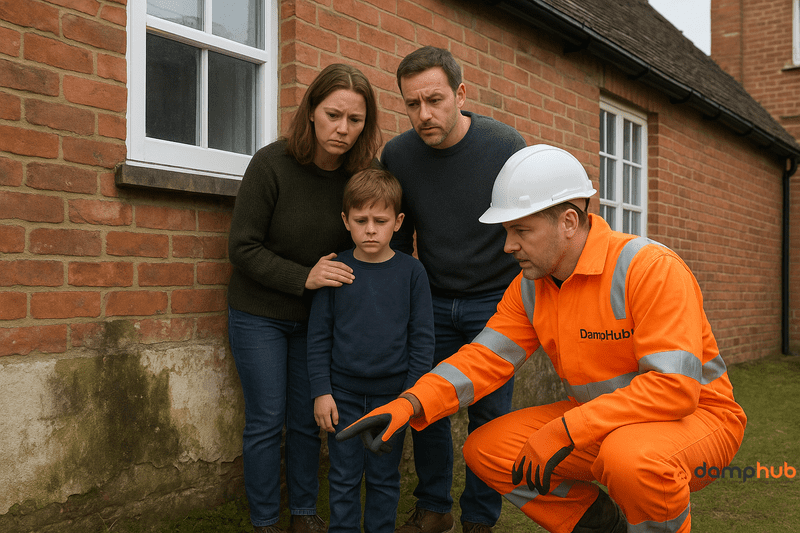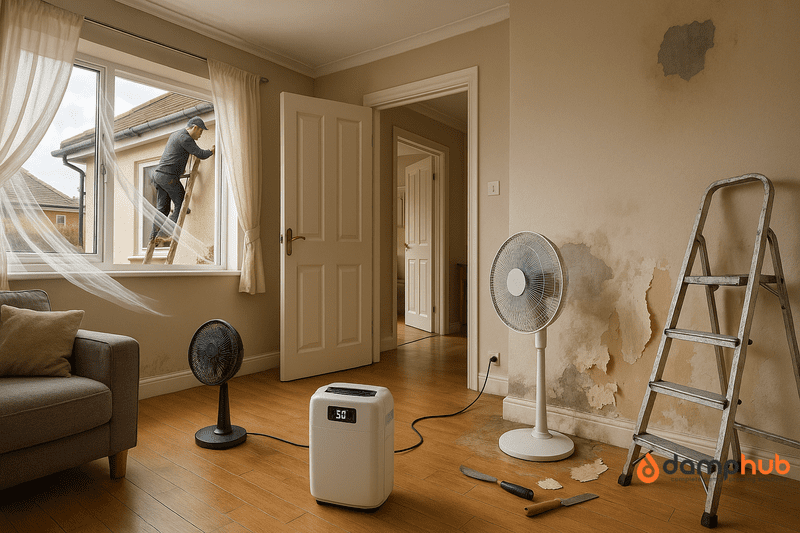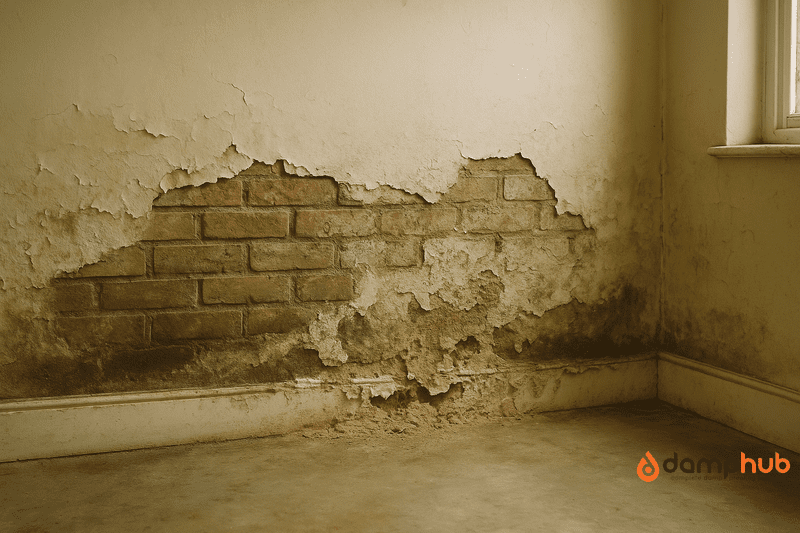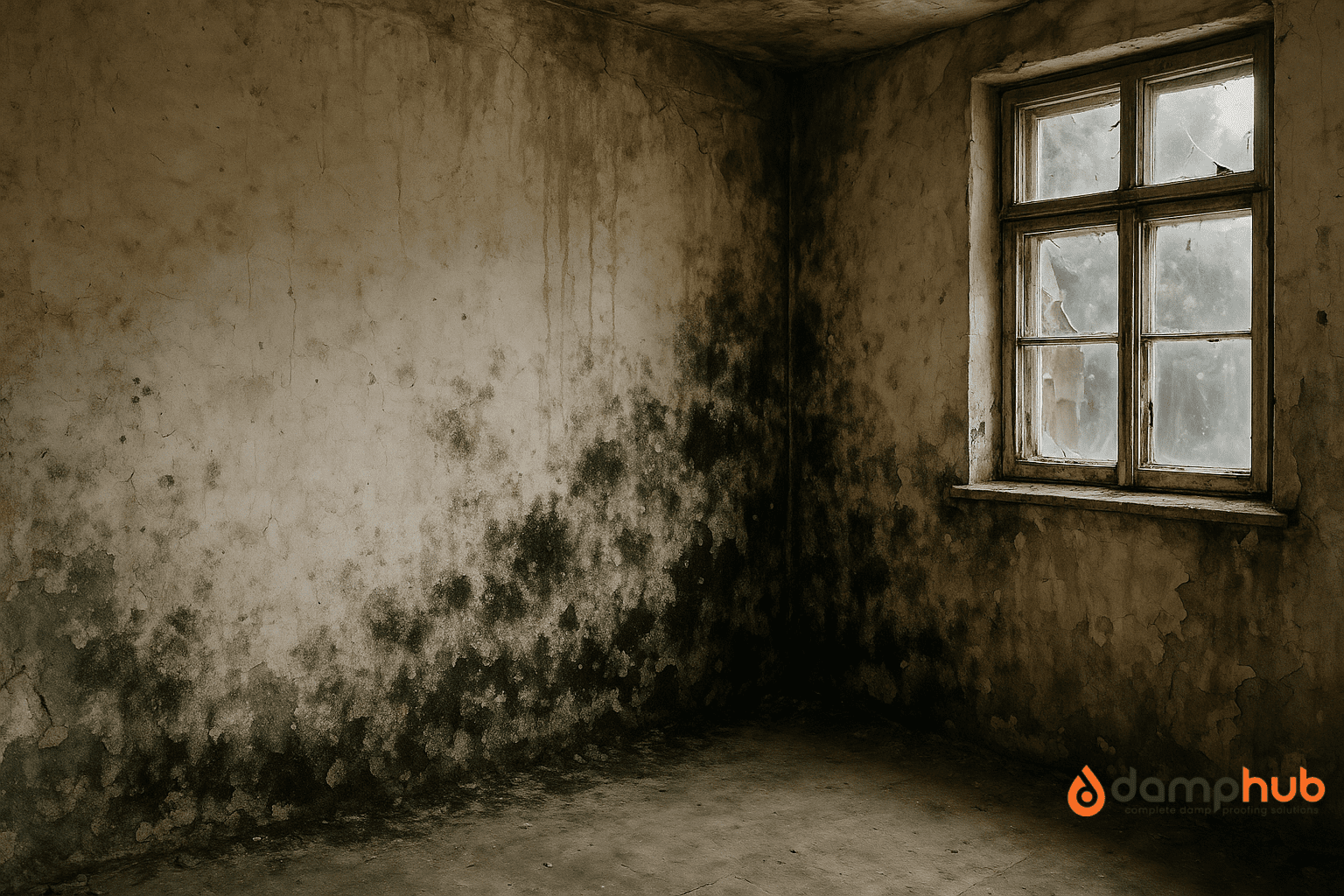
Spotting damp in your home can be unsettling. It’s not just about an odd patch on the wall or a musty smell. Damp can signal deeper problems hiding behind your plaster or under your floors. That’s why many UK homeowners end up asking the same question: “Damp in house, who to call?”
Do you ring a builder, a damp proofing specialist, or even your insurer? The answer depends on the type of damp, its severity, and whether it’s related to plumbing, ventilation, or structural issues.
If you’re not sure what you’re dealing with, this guide will walk you through the questions most UK homeowners ask about damp: how to check for damp, what makes damp serious, and—most importantly—who you should call to fix it.
But first, make sure to read our other article on damp proofing advice for homeowners for more insights on how to manage damp in your UK home.
How Do I Check if I Have Damp?
The first step in answering “damp in house who to call” is confirming that you have damp. It’s not always obvious—sometimes the signs creep in over the years before they’re noticed.
Here are the general signs of damp to look for:
- Visual clues – bubbling paint, peeling wallpaper, black mould patches, brown tide marks creeping up walls.
- Smell – a musty, earthy odour that doesn’t shift even with fresh air.
- Touch – a wall that feels colder or damper than others in the same room.
- Furniture clues – wardrobes that smell musty, clothes feeling damp to the touch, and condensation on windows.
Specifically, here’s how to tell if there is damp in the walls:
- Check paint or plaster. If it’s flaking or crumbling, moisture has likely penetrated.
- Press gently—soft patches mean plaster has lost integrity.
Additionally, here’s how to tell if there is damp under a house:
- Crawl spaces or suspended timber floors often smell musty first.
- Timber joists may exhibit signs of woodworm infestation or fungal growth.
- Rising damp leaves clear tide marks, usually up to 1 metre high.
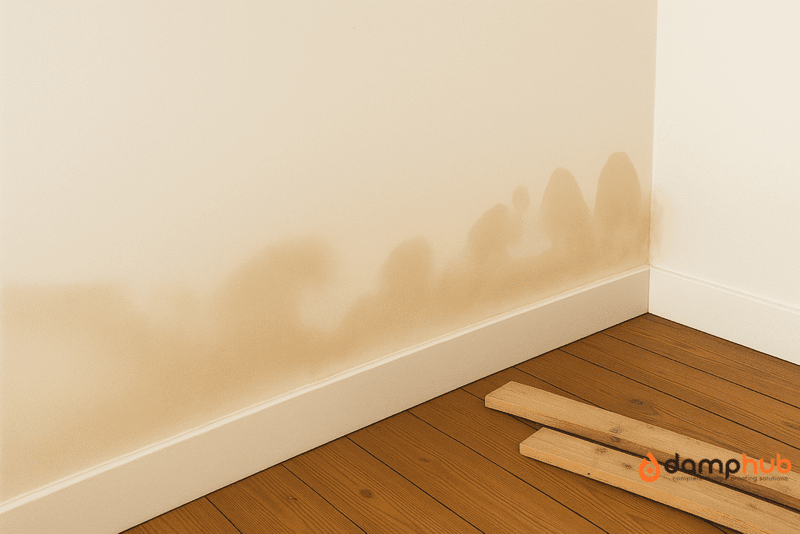
How Serious is Damp in a House?
Damp is never just cosmetic. It can damage your home and affect your health if left untreated.
- Structural damage: Weakens plaster, causes paint to peel, and rots timbers.
- Health risks: Creates the perfect environment for mould, which can trigger asthma, allergies, and breathing problems.
- Rising costs: The longer the damp is ignored, the more expensive the repairs become.
So when you’re wondering “damp in house, who to call?” remember what’s at risk:
- Your health
- Your home’s structure
- Your property value
All three will suffer if damp isn’t dealt with quickly.
How Do You Know if Damp is Serious?
The severity of damp depends on how far it has spread and whether it’s starting to damage the structure. A house with damp often feels oppressive — the air is heavy, rooms take longer to heat, and breathing can feel harder than normal. Curtains, clothes, and bedding may even feel clammy despite being dry to the touch.
Clear signs that damp has become serious include:
- Mould returning quickly after cleaning.
- Sagging plaster or warped skirting boards.
- Persistent chest or breathing problems among residents.
- Visible rot in timber beams or flooring.
Pro Tip
Don’t rely on bleach sprays to “treat” damp. These only kill surface mould. The moisture behind the wall remains. If you’re wondering “damp in house who to call to fix it properly?”—a qualified damp proofing contractor should be at the top of your list.
How Do Surveyors Check for Damp?
Surveyors use proper tools rather than guesswork:
- Moisture meters – detect how deep damp has penetrated.
- Thermal imaging cameras – highlight cold spots and hidden leaks.
- Salt analysis – tells the difference between groundwater salts (rising damp) and rainwater salts (penetrating damp).
If you’re buying or selling, mortgage lenders often require a damp check. This is where many homeowners first stumble upon the question: “damp in house who to call before committing?” The answer is: book an independent damp surveyor. They aren’t tied to selling treatments, so their advice is unbiased.
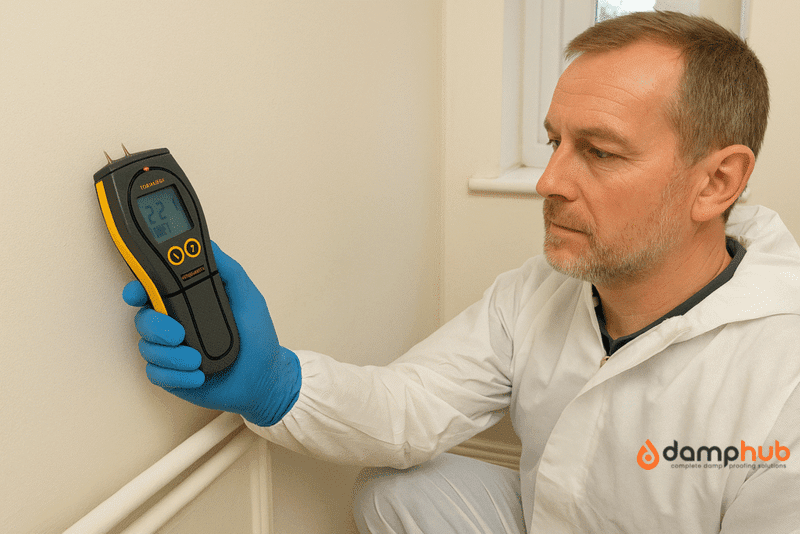
What to Do if You Find Damp in Your House?
- Confirm the type of damp – is it condensation, penetrating damp, or rising damp?
- Take immediate steps – ventilate rooms, run extractor fans, and use a dehumidifier if needed.
- Stop temporary damage – wipe away condensation, move furniture away from damp walls, protect fabrics.
- Book a survey – if unsure who to call for damp in the house, start with a damp surveyor. They can point you toward the right trade (plumber, roofer, or damp proofer).
🛠️ Try This
Stick a piece of aluminium foil flat on the damp patch overnight. If the back of the foil is wet, the moisture is coming through the wall (penetrating or rising damp). If the front is wet, it’s condensation. That’s a quick trick before you decide “damp in house who to call”.
What Happens if Damp is Left Untreated?
Leaving damp unchecked is risky. Over time, it can:
- Rot structural timbers and floor joists
- Crumble plaster and mortar joints
- Trigger black mould growth (toxic spores in some cases)
- Lower property value and stall sales
- Lead to health problems like asthma and chronic coughs
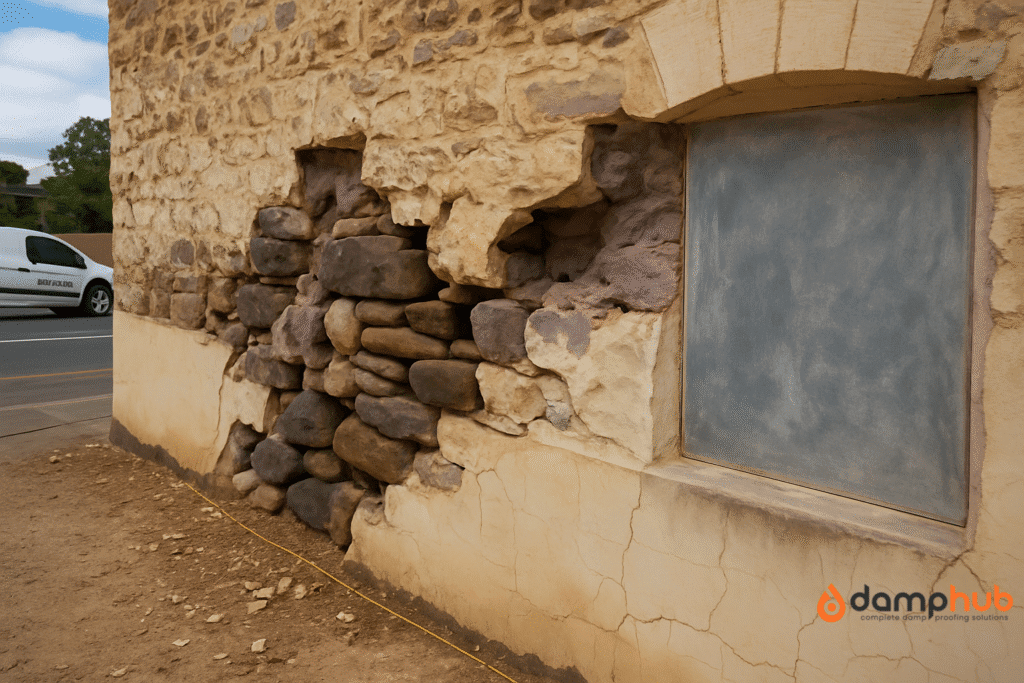
Good to Know
Mortgage lenders often down-value properties if untreated damp is flagged in surveys. Some buyers walk away altogether. The cost of ignoring damp often far exceeds the cost of early intervention.
When considering damp in house who to call, the worst mistake is delaying.
Can You Get a Free Damp Survey?
Yes. Many UK damp proofing companies offer free surveys. But there’s a catch: these are often used as sales tools to recommend expensive treatments.
If you want an unbiased report, consider paying for an independent surveyor. They don’t profit from selling damp treatments, so their advice is evidence-based.
For peace of mind, especially in older homes, ask yourself: “damp in house who to call for honest advice?” The answer is often: an independent damp survey first, then a specialist contractor if needed.
Helpful guide to get you started: How Do I Choose a Damp Surveyor?
Final Word
Damp is one of those problems that’s easy to ignore but costly to leave. If you’re staring at a suspicious wall patch or sniffing that musty smell again, the real question isn’t if you should act—it’s “damp in house who to call first?”
Start with a damp survey. From there, you’ll know whether you need a plumber, roofer, or damp proofing company. Acting early protects your health, your home, and your wallet.
Still worried about damp in house who to call? Contact our team at Damphub today. We’ll give you the right information, explain your options clearly, and point you towards the right professional help — without the sales pitch.
Damp in House Who to Call? Answering the Most Common Questions

Can a House Collapse from Damp?
Collapse is rare but not impossible. Severe damp left untreated for decades can compromise timber frames and brickwork.
Think of it as slow-motion structural damage:
– Timbers rot and lose strength.
– Mortar joints crumble.
– Floors sag as joists decay and,
– Concrete starts crumbling.
If you’ve let it reach this stage, the question isn’t “damp in house who to call?”—it’s “how quickly can I get a structural engineer to inspect?”
Can You Live in a House with Damp?
You can, but it comes at a cost. Living with damp means:
– Breathing in mould spores daily
– Heating bills rising (damp walls lose heat faster)
– Constantly battling musty odours and ruined décor
– Children and elderly residents at risk of health complications
If your home feels persistently damp, don’t ignore it. “Damp in house who to call?”A damp proofing company or surveyor should be your first point of contact.
Can Damp be Fixed in a House?
Yes. No matter how bad it looks, damp can be fixed with the right solution:
– Rising damp: Damp proof course injection, replastering
– Penetrating damp: Repair roofs, gutters, walls, and apply water-repellent coatings
– Condensation: Improve airflow with trickle vents, extractor fans, and sometimes mechanical ventilation
Pro tip: Always get a written guarantee for damp proofing work. Reputable UK firms provide 20–30 years of cover. That way, if the issue returns, you’re protected.
So if you’re searching “damp in house who to call for reliable fixes”, the answer is clear: a damp proofing specialist with a guarantee.
Who Investigates Damp?
Depending on the source, different professionals may get involved:
– Damp proofing specialists – diagnosis and treatment
– Independent surveyors – impartial assessment
– Plumbers – if leaks are suspected
– Roofers – if water ingress from above is likely
– Structural engineers – if damage is advanced
If you don’t know where it’s coming from, book a damp survey first. That way, you won’t waste money calling the wrong trade.
Related article: Who Can Carry Out a Damp Survey?

